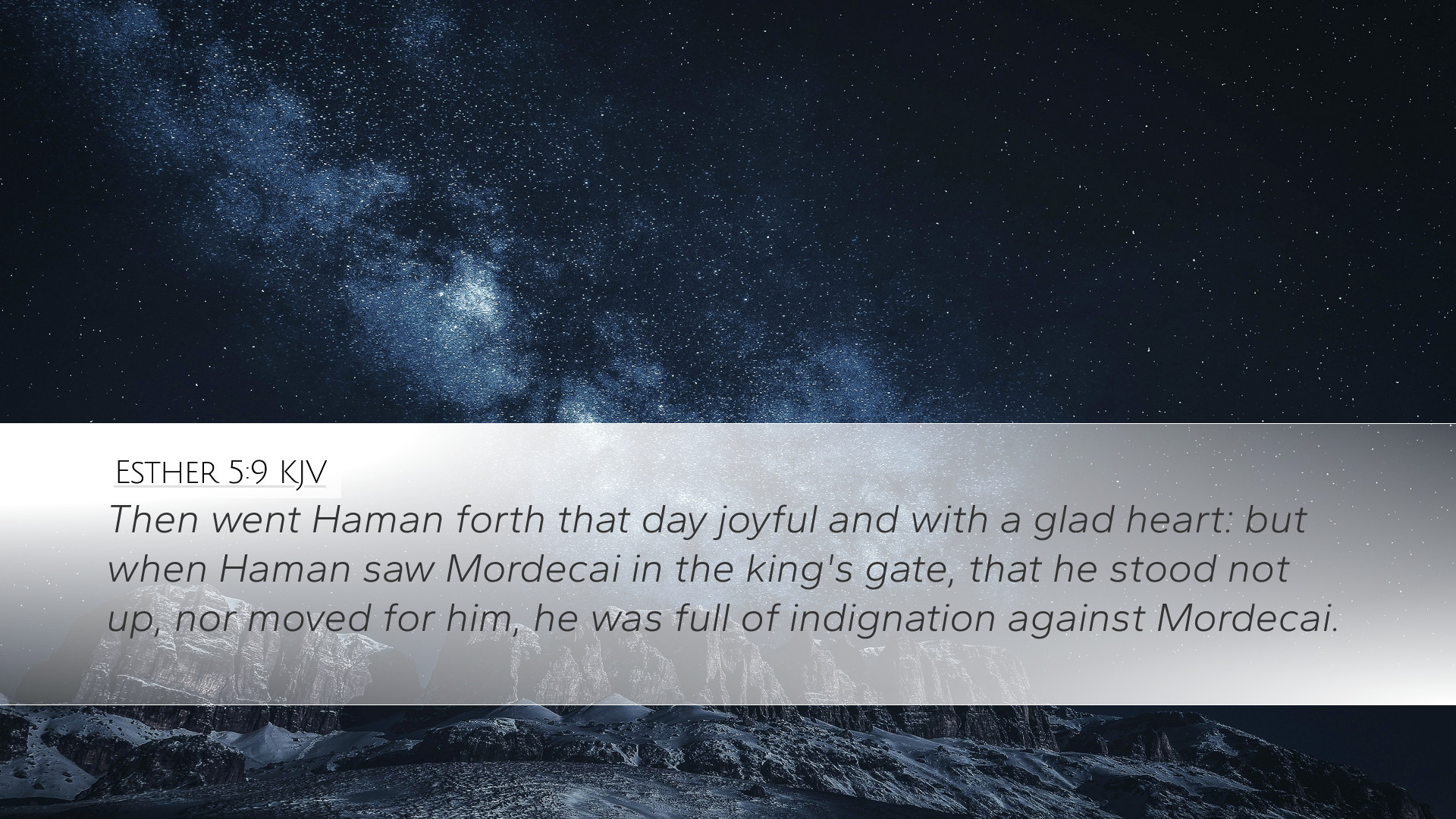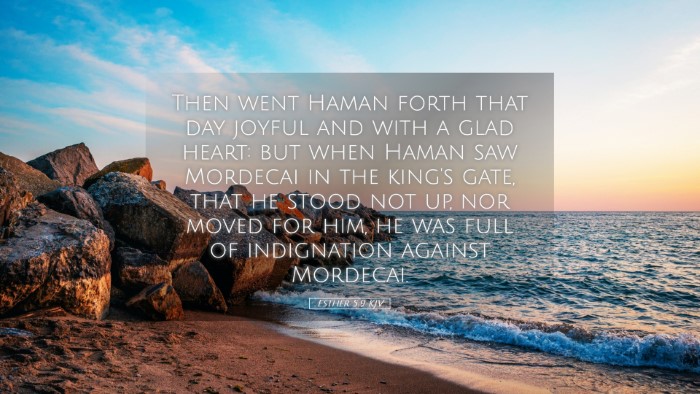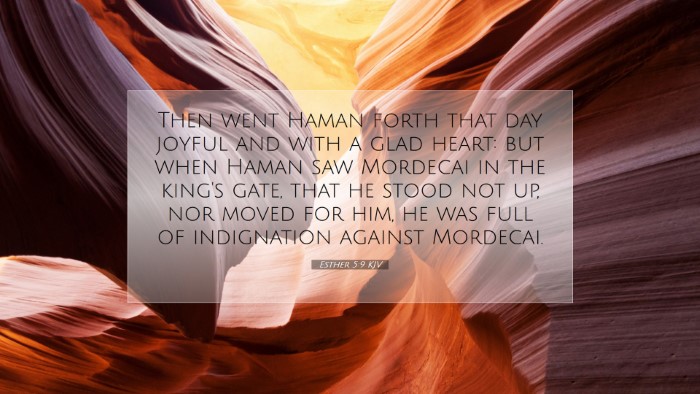Old Testament
Genesis Exodus Leviticus Numbers Deuteronomy Joshua Judges Ruth 1 Samuel 2 Samuel 1 Kings 2 Kings 1 Chronicles 2 Chronicles Ezra Nehemiah Esther Job Psalms Proverbs Ecclesiastes Song of Solomon Isaiah Jeremiah Lamentations Ezekiel Daniel Hosea Joel Amos Obadiah Jonah Micah Nahum Habakkuk Zephaniah Haggai Zechariah MalachiEsther 5:9
Esther 5:9 KJV
Then went Haman forth that day joyful and with a glad heart: but when Haman saw Mordecai in the king's gate, that he stood not up, nor moved for him, he was full of indignation against Mordecai.
Esther 5:9 Bible Commentary
Bible Commentary on Esther 5:9
Esther 5:9: "Then went Haman forth that day joyful and with a glad heart: but when Haman saw Mordecai in the king's gate, that he stood not up, nor moved for him, he was full of indignation against Mordecai."
Introduction
The Book of Esther, a narrative steeped in themes of providence, identity, and the unfolding of God's plan, presents a vivid portrayal of the tension between the proud and the humble. In Esther 5:9, we witness Haman’s elation turned to fury upon encountering Mordecai, setting the stage for the unfolding drama of pride and downfall. This commentary synthesizes insights from various public domain sources like Matthew Henry, Albert Barnes, and Adam Clarke to provide a comprehensive exploration of this pivotal moment.
Contextual Overview
The events in Esther take place during the reign of King Ahasuerus (Xerxes I) of Persia, amidst the Jewish people's exile. Haman's rise to power contrasts sharply with the humble position of Mordecai, a Jew. The tension begins to build as Haman embodies human arrogance and pride, while Mordecai represents steadfastness and integrity.
Analysis of Key Themes
The Nature of Pride
According to Matthew Henry, Haman is depicted as a man of significant influence, whose position has inflated his ego. Initially joyful from having been invited to dine with the king and queen, Haman's pride is evident. However, that pride becomes a vulnerability; Henry warns that pride often precedes a fall, hinting at the precariousness of Haman's situation. The joy of Haman represents false securities rooted in status and recognition, which are ultimately empty without humility.
The Response of Mordecai
Albert Barnes emphasizes Mordecai's refusal to bow as not merely an act of defiance but as a testament to his faith and identity. In the face of an oppressive decree, Mordecai stands firm in his convictions. His actions resonate with the Biblical principle of not ascribing ultimate authority to human powers over divine command. Barnes' commentary suggests that Mordecai's behavior reflects a profound commitment to God and the Jewish heritage, reminding readers of the cost of standing for righteousness.
The Reaction of Haman
Adam Clarke elaborates on Haman's indignation, illustrating the psychological shift from joy to rage. Seeing Mordecai's disrespect leads Haman to feel personally affronted, showing how unchecked pride can swiftly turn to wrath. Clarke interprets Haman’s response as indicative of a moral failing, where the inability to accept varying views or actions creates hostility—an attitude that ultimately leads to his downfall. This interplay serves as a cautionary tale about the consequences of pride and anger.
Theological Implications
The Sovereignty of God
The events described in Esther can be understood through the lens of divine sovereignty. Despite Haman's plans and apparent control, God's providential hand directs the narrative towards justice and deliverance for His people. This theme resonates throughout public domain commentaries, emphasizing that although Haman enjoys temporary privilege, God’s overarching plan cannot be thwarted by human pride. As such, Esther 5:9 invites readers to reflect on the ultimate authority of God over both the exalted and the humble.
The Call to Humility
Another significant takeaway from this verse is the call to humility. In a world that often celebrates pride and ambition, biblical teachings remind us that true elevation comes from humility before God and service to others. Both Henry and Barnes encourage believers to consider the virtues of humility and patience, contrasting Haman's brashness with Mordecai's steady resolve. Those in leadership and influence would do well to remember that recognition and esteem from others do not equate to true significance in the eyes of God.
Practical Applications
- Self-Examination: Reflect on personal attitudes of pride or indignation in response to others. How do these feelings align with God's word?
- Encouragement to Stand Firm: Just as Mordecai stood for his convictions, be encouraged to stand for what is right, even when faced with societal pressure.
- Humility in Leadership: Leaders should cultivate a spirit of humility, recognizing that true strength lies in support and servitude rather than dominance.
Conclusion
Esther 5:9 serves as a poignant reminder of the dangers of pride and the significance of faithful standing amidst opposition. Through the joy of Haman and the steadfastness of Mordecai, we are called to reasons of faith, humility, and the overarching sovereignty of God in our lives. For pastors, students, theologians, and scholars, this passage not only challenges us to examine our hearts but also to embrace the radical implications of living under God’s governance, where true dignity is found.


